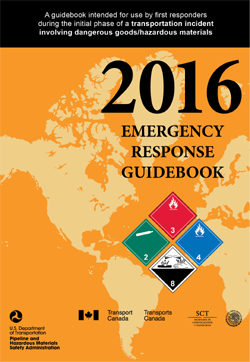2016 Emergency Response Guidebook Summary of Changes
“How to use this Guidebook” instructions are now in a flowchart

Many sections have been expanded and/or revised, including:
- Shipping documents (Papers)
- Table of markings, labels and placards and initial response guide to use on-scene
- Rail car and road trailer identification charts (including more detailed information on each)
- Pipeline transportation
- Protective clothing
- Improvised explosive device (IED) safe stand off distance chart
- Glossary
- Emergency response telephone numbers
New sections have been added:
- Local emergency response numbers (to be filled by user)
- Table of Contents
- Globally harmonized systems (GHS) of classification and labeling of chemicals
- Information about emergency response assistance plans (ERAP) for Canadian users
Index list of dangerous goods in order of ID number (yellow-bordered pages), and the Index list of dangerous goods in alphabetical order (blue-bordered pages):
- Addition of all new dangerous goods listed in the UN Recommendations on the Transport of Dangerous Goods up to the 19th revised edition
Emergency response guides (“Guides”/orange-bordered pages):
- Revision of some guide information
- Two guides have been added for adsorbed gases
- Identification of potential emergency response assistance plan (ERAP) products for Canadian users
Table of initial isolation and protective action distances (Green-bordered pages):
- Updated initial isolation and protective action distances (Tables 1 and 3) based on new toxicity data and reactivity research
- Added “Estimating wind speed from environmental clues” for Table 3


![]()




